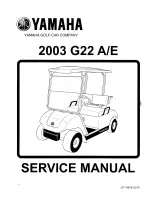
OPERATION AND SERVICE INFORMATION
Page 23
Owner’s Manual and Service Guide
Read all of manual to become thoroughly familiar with this vehicle. Pay particular attention to all Notes, Cautions and Warnings
•
The charging must take place in an area that is
well ventilated and capable of removing the hydro-
gen gas that is generated by the charging pro-
cess. A minimum of five air exchanges per hour
is recommended.
•
The charging connector components are in good
condition and free from dirt or debris.
•
The charger connector is fully inserted into the
vehicle receptacle.
•
The charger connector/cord set is protected from
damage and is located in an area to prevent injury
that may result from personnel running over or
tripping over the cord set.
•
The charger is automatically turned off during the
connect/disconnect cycle and therefore no electri-
cal arc is generated at the DC plug/receptacle
contacts.
In some portable chargers, there will be a rattle
present in the body of the charger DC plug.
This rattle is caused by an internal magnet contained within the
charger plug. The magnet is part of the interlock system that
prevents the vehicle from being driven when the charger plug is
inserted in the vehicle charging receptacle.
AC Voltage
Battery charger output is directly related to the input volt-
age. If multiple vehicles are receiving an incomplete
charge in a normally adequate time period, low AC volt-
age could be the cause and the power company should
be consulted.
TROUBLESHOOTING
In general, troubleshooting will be done for two distinct
reasons. First, a battery that performs poorly and is out-
side of the manufacturers specification should be identi-
fied in order to replace it under the terms of the
manufacturer’s warranty. Different manufacturers have
different requirements. Consult the battery manufacturer
or a manufacturer representative for specific require-
ments.
The second reason is to determine why a particular vehi-
cle does not perform adequately. Performance problems
may result in a vehicle that runs slowly or in a vehicle that
is unable to operate for the time required.
A new battery must mature before it will develop its max-
imum capacity. Maturing may take up to 100 charge/dis-
charge cycles. After the maturing phase, the older a
battery gets, the lower the capacity. The only way to
determine the capacity of a battery is to perform a load
test using a discharge machine following manufacturer’s
recommendations.
A cost effective way to identify a poorly performing bat-
tery is to use a hydrometer to identify a battery in a set
with a lower than normal specific gravity. Once the partic-
ular cell or cells that are the problem are identified, the
suspect battery can be removed and replaced. At this
point there is nothing that can be done to salvage the
battery; however, the individual battery should be
replaced with a good battery of the same brand, type and
approximate age.
Hydrometer
A hydrometer (P/N 50900-G1) is used to test the state of
charge of a battery cell (Ref Fig. 30 on page 24). This is
performed by measuring the density of the electrolyte,
which is accomplished by measuring the specific gravity
of the electrolyte. The greater the concentration of sulfu-
ric acid, the more dense the electrolyte becomes. The
higher the density, the higher the state of charge.
To prevent battery explo-
sion that could result in
severe personal injury or
death, never insert a metal thermometer into a bat-
Fig. 29 Freezing Point of Electrolyte
1.100
1.120
1.160
1.200
1.240
1.280
1.140
1.180
1.220
1.260
1.300
-9
-15
-21
-26
-32
-37
-43
-48
-54
-60
-65
-71
E
L
E
C
T
R
O
L
Y
T
E
T
E
M
P
E
R
A
T
U
R
E
SPECIFIC GRAVITY ELECTROLYTE FREEZING POINT
O
C
+15
+5
-5
-15
-25
-35
-45
-55
-65
-75
-85
-95
O
F
Ref Fpe 1
!
!
Summary of Contents for FLEET PDS GOLF CAR
Page 8: ...Page vi Owner s Manual and Service Guide TABLE OF CONTENTS Notes...
Page 12: ...Owner s Manual and Service Guide SAFETY INFORMATION Page x Notes...
Page 47: ...Page 27 GENERAL SPECIFICATIONS Owner s Manual and Service Guide GENERAL SPECIFICATIONS...
Page 60: ...Page 40 Owner s Manual and Service Guide GENERAL SPECIFICATIONS Notes...
Page 61: ...Page 41 Owner s Manual and Service Guide WARRANTY LIMITED WARRANTIES...
Page 66: ...Page 46 Owner s Manual and Service Guide WARRANTY Notes...
Page 68: ...Page 48 Owner s Manual and Service Guide DECLARATION OF CONFORMITY...
Page 69: ...Page 49 DECLARATION OF CONFORMITY Owner s Manual and Service Guide...
Page 70: ...Page 50 Owner s Manual and Service Guide DECLARATION OF CONFORMITY...
Page 71: ...Page 51 DECLARATION OF CONFORMITY Owner s Manual and Service Guide...
Page 72: ...Page 52 Owner s Manual and Service Guide DECLARATION OF CONFORMITY...
Page 73: ...Page 53 DECLARATION OF CONFORMITY Owner s Manual and Service Guide...
Page 74: ...Page 54 Owner s Manual and Service Guide DECLARATION OF CONFORMITY Notes...
Page 75: ...Appendix A 1 LABELS AND PICTOGRAMS Owner s Manual and Service Guide LABELS AND PICTOGRAMS...



































